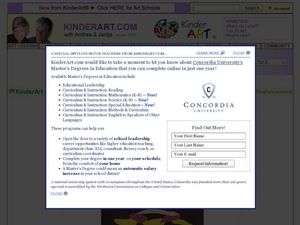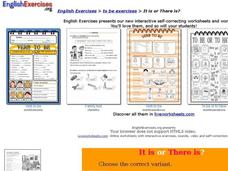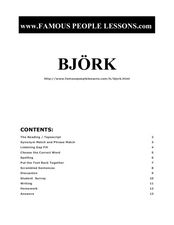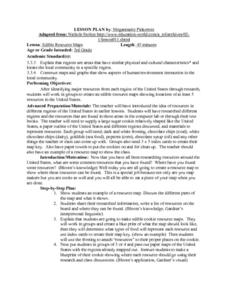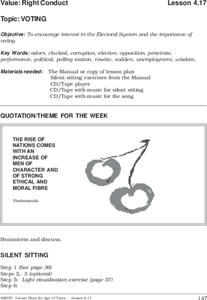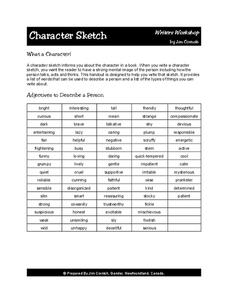Curated OER
Homonyms Quiz 34
Students complete an online homonym quiz. In this homonym lesson, students read the sentences and select the best homonym to complete the 20 sentences.
Curated OER
Hamburger Collage
Learners review shapes and their cutting skills by making a hamburger collage. In this shapes lesson plan, students identify shapes that make up the food in a hamburger, cut out the food from construction paper, and create a collage out...
Curated OER
Preservation and the Power of Light
Students identify the effect of light on objects. In this scientific inquiry lesson, students use a chart to write a hypothesis about what will happen when colored construction paper is left in sunlight. Students observe and discuss the...
Curated OER
Match the suffixes
In this suffixes learning exercise, students match the suffixes to the base words they go with. Students match 10 suffixes to 10 different base words.
Curated OER
Traditional Inuit Games
Students explore Inuit culture. For this cultural diversity lesson, students collaborate to learn Inuit games and teach them to their classmates.
Curated OER
ESL Colors Activity
In this ESL colors worksheet, students watch a video titled "The Colors of the Earth," then choose the correct colors to describe pictures and the correct animals being described.
Curated OER
The Lesson: Space Exploration
Students explore space. In this current events activity, students visit selected websites to learn about NASA, Mars, the Seti Institute, and space exploration terminology. Students make space glossaries and their own telescopes.
Curated OER
Out and About: Sound
Students visit science museums. In this hands-on science lesson, students visit the Magna Science Adventure Center, Thinktank, and the Museum of Science and Industry.
Curated OER
There Is/Are - Counting Stars
In this counting stars worksheet, students fill in the blanks to a passage, complete the questions, and write sentences with possessive forms. Students complete 3 activities.
Curated OER
English Exercises: It is or There is?
In this online interactive English worksheet, learners respond to 14 fill in the blank questions that require them to use verbs appropriately. Students may submit their answers to be scored.
Curated OER
Want to Sleep Better?
In this review worksheet, students complete sentences by filling in the blank. The students use comparatives, etc. The worksheet is intended to test the student's English Language skills.
Curated OER
Past Simple and Prepositions
In this past simple and prepositions worksheet, students put prepositions into sentences, put sentences into the past simple tense, and more. Students complete 5 activities.
Curated OER
Björk
In this Bjork worksheet, students read about the life of the performer, then complete a variety of comprehension activities. An answer key is included.
Curated OER
Bermuda Today: Who Were Its Geologic Ancestors?
Young scholars explore how the island of Bermuda came to be.
Curated OER
Fish Tank Optics: Learning How Light Travels
Learners examine light waves and see how they travel. They explain that light moves in waves, which can bounce off of or go through materials. They use a flashlight to shine on a variety of objects.
Curated OER
Draw Like an Egyptian
Second graders explore Egyptian life and art and examine Egyptian figures and translate them to their own artwork. Students use objects other than paint brushes to paint. Students practice using watercolors and practice figure proportions.
Curated OER
Take A Look Around! Architecture and the Built Environment
Students examine the types of architecture used to build the San Jose Museum of Art. Based on the grade level, they participate and answer questions based on the different pieces of art examined. They also discover how weight is...
Curated OER
Edible Resource Maps
Third graders work in groups to create an edible resource map showing locations of at least five resources in the United States. Students research on the internet different regions and the resources that are found in those areas. They...
Curated OER
Mechanism of Our Eyes
Students study the eye as the organ of vision, They look at a drawing of the eyes and study the names of the parts. While working with a partner, they observe what happens when the lights are turned lower and lower. Finally, they look at...
Curated OER
VOTING
Students discuss 'The importance of voting'. They elect 5 candidates - each representing one of the five values. Each candidate presents a case why their value is important. The other class members then vote for whichever value/candidate...
Curated OER
Character Sketch
For this language arts worksheet, students use the chart of words as a tutorial for writing a formal character sketch. The words are meant to make the description more vivid.
Curated OER
Teachers: Citizenship: Criminal Justice System
High schoolers, in groups, study Asbos and their conditions. After watching a 10-minute video, they answer questions in the Asbo hotseat. Also, they develop arguments that are not necessarily their own.
Curated OER
Natural Dye Lesson Plan
Students investigate major pigments which occur naturally in fruits and vegetables, and to use them to dye a number of items. They study the effects of pH on anthocyanin on pigments.



